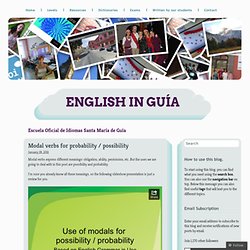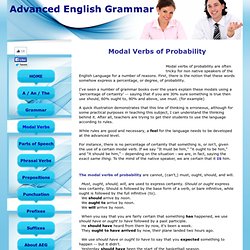

Speculation practice for test. Advanced Level: Past Modals of Deduction. Present and Past Modals of Deduction with Sherlock Holmes. Modal verb + have + past participle. Looking out of your window in the morning, you notice that all the flowers in your garden are missing.

What happened? You take a guess at it: "A rabbit might have eaten all my flowers. " Let's take a look at that form. might (modal) + have + eaten (past participle verb) We use the modal might (you can also use may or could) because they show that we are not 100% sure about what happened. Here are some other examples: "My neighbour could have stolen the flowers" "The wind might have blown them all away. " You can find more information here: Speculating about past events Erica must ___ gone out. Overview of Modal Verbs in English.pdf. Possibility and deduction. B1 Grammar: Past Modals for Deduction.
ESL Teaching Resources on the Web. Be a Detective in English! (Modals for Speculation) Be a Detective in English!

(Modals for Speculation) posted by Jeff Beyer on August 22, 2013 Detectives are cool. They have to collect evidence. Examine that evidence. You must have done it! Wait! Let’s take a simple case as an example: The Case of the Missing Slice of Chocolate Cake… First we have the cake. Anyone could have taken the cake. So, we know the suspect must be a chocolate lover. It may have been him, but he seems to like cookies. And it can’t have been this guy. Aha! So, there we have it. We can use MODALS to speculate in English. Must, could, may, may not, might, might not, can’t, and couldn’t. We can put these modals of speculation into 3 categories. . #1) If we are very certain that something is true (95%-99%), we use must.
For example: She must have stolen the cake! #2) If we are talking about things we believe are possibilities (30%-50%) we use could, may, may not, might, and might not. Anyone could have taken the cake. NOTICE! 1) Why is the man so angry? Modals Deduction Past. Past modal verbs of deduction. Modal verbs Deduction and probability. Modal verbs for probability / possibility. Modal verbs express different meanings: obligation, ability, permission, etc.

But the uses we are going to deal with in this post are possibility and probability. I’m sure you already know all these meanings, so the following slideshow presentation is just a review for you. After reading the presentation, you can do the activities in units 27-35 in your grammar book. But if this isn’t enough, I’m going to add some more links for further practise: English as a second language: this link includes an explanation and some online activities.Eoi Burgos: thorough explanation and some acitivities.BBC Learning English – The Flatmates. I thought this post couldn’t be so long, but it is. See you!!! Like this: Like Loading... Modal Verbs of Probability Quiz. Modal verbs of probability/certainty - Quiz 2. Modal Verbs of Probability. Modal verbs of probability are often tricky for non native speakers of the English Language for a number of reasons.

First, there is the notion that these words somehow express a percentage, or degree, of probability. I've seen a number of grammar books over the years explain these modals using a 'percentage of certainty' -- saying that if you are 30% sure something is true then use should, 60% ought to, 90% and above, use must. (for example) A quick illustration demonstrates that this line of thinking is erroneous, although for some practical purposes in teaching this subject, I can understand the thinking behind it. After all, teachers are trying to get their students to use the language according to rules. While rules are good and necessary, a feel for the language needs to be developed at the advanced level. For instance, there is no percentage of certainty that something is, or isn't, given the use of a certain modal verb. Past modal verbs of deduction. Modal Verbs of Probability Exercise. Modals – deduction past.
Modal Verbs of Deduction.